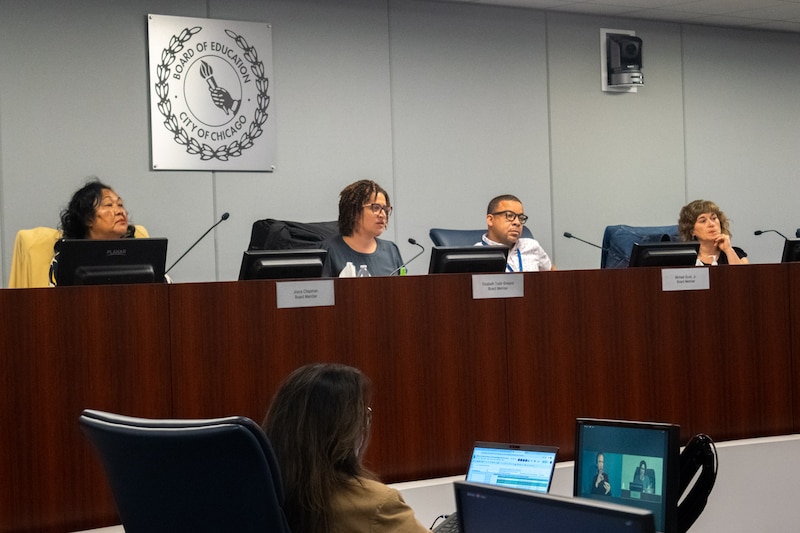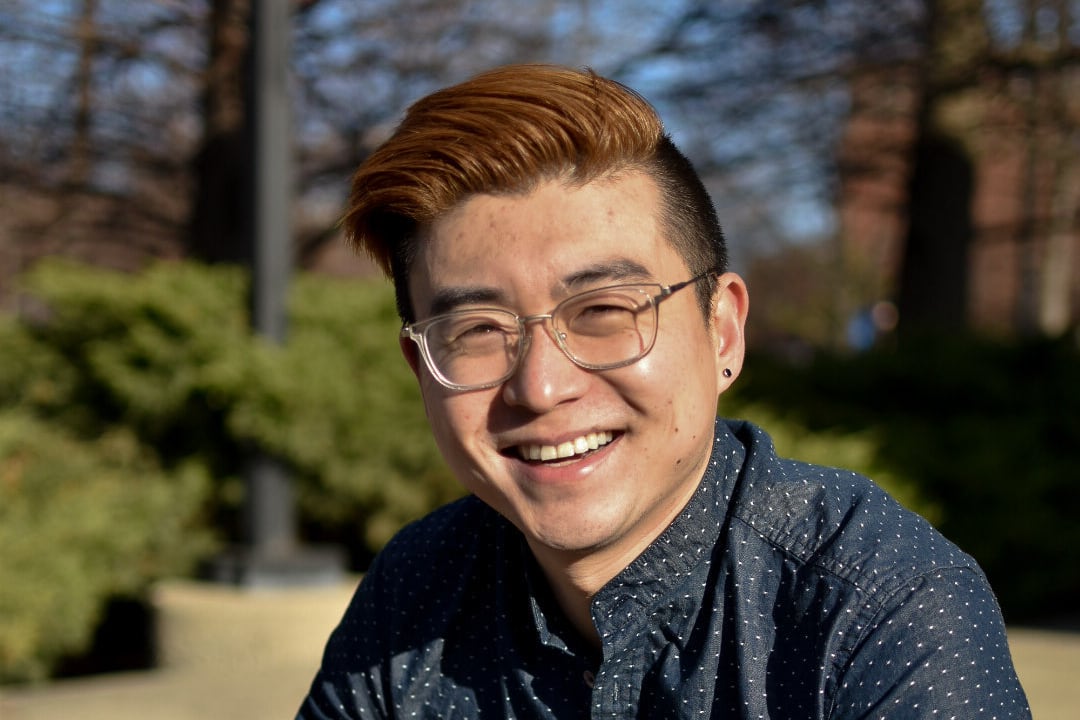Sign up for Chalkbeat Chicago’s free daily newsletter to keep up with the city’s public school system and statewide education policy.
Chicago Mayor Brandon Johnson announced his appointees to the Chicago Board of Education Wednesday, naming Jianan Shi of the parent advocacy group Raise Your Hand to lead the board and replacing all but one of the members appointed by former Mayor Lori Lightfoot.
Shi, a former high school teacher in Boston and Chicago, will replace former state lawmaker Miguel del Valle. He is resigning from Raise Your Hand to take on the new role.
The lone Lightfoot appointee who was reappointed, history professor Elizabeth Todd-Breland, will serve as the board’s vice president. The other new members are: Mary Fahey Hughes, Mariela Estrada, Rudy Lozano, Michelle Morales, and Tanya Woods.
Their terms will run until Jan. 1, 2025, when a new 21-member, partially elected school board will take over.
Shi, who has a master’s degree in education from Boston College, taught high school science in Boston and later at Solorio High School on Chicago’s Southwest Side. He stepped in as Raise Your Hand’s executive director in 2019.
In a statement, Shi vowed to be “the hardest working board member CPS has ever seen.” He noted that all newly appointed board members bring experience working with local school councils and have been district parents, educators, or both.
“As stewards of the transition toward an elected school board, we have much to add to and change over the next year and a half,” he said.
Johnson was elected this past spring after working for a decade as a Chicago Teachers Union organizer. He defeated former Chicago Public CEO Paul Vallas and ran on a progressive platform buoyed by the CTU, which has argued for a broader approach to school improvement focused on tackling issues outside classrooms, such as affordable housing, food insecurity, and gun violence.
His school board appointments offer another glimpse of his vision for the country’s fourth largest district as the city nears a high-stakes transition away from longstanding mayoral control of its school district to an elected school board. The new board takes over as the district also faces a more precarious financial picture, with federal COVID recovery dollars running out next year and rising costs related to employee pensions and other debt.
In the run-up to the appointments, some parent and disability rights advocacy groups argued the Johnson administration should have done more to clearly spell out its criteria for board members and solicit applications more broadly.
Fahey Hughes, who formerly served as Raise Your Hand’s parent liaison for special education, has been an outspoken advocate for students with disabilities in the district. She leads 19th Ward Parents for Special Education.
Estrada is currently the director of community engagement at the United Way of Metro Chicago; she also formerly worked at the city’s Inspector General’s office and at the Brighton Park Neighborhood Council, a nonprofit that partners with the district. Lozano is a vice president at J.P. Morgan Chase; he formerly worked for the community group Enlace Chicago and taught in alternative high schools.
Morales is the president of the Woods Fund Chicago and formerly led the Mikva Challenge, a youth advocacy organization. And Woods is a practicing attorney who currently serves as the executive director of the Westside Justice Center.
Morales and Lozano both taught at alternative public high schools, according to their online profiles, while Woods and Estrada list community organizing roles in their past work experience.
“It’s my honor to bring together such a diverse group of people from community, business, philanthropy and elsewhere to collaborate around a vision for our schools that ensures every student has access to a fully resourced, supportive, and nurturing learning environment,” Johnson said in a statement.
Johnson’s school board picks follows his appointment of teachers union leader Jen Johnson as his education deputy. The teachers union’s foundation has contributed financially to Raise Your Hand and some of the other community-based nonprofits, such as Enlace and Brighton Park Neighborhood Council, where Johnson’s board picks have worked.
Education advocates sought a voice in board choices
Last month, about a dozen education advocacy groups appealed to Johnson to ensure a more open and transparent process for selecting board members. The groups representing parents and other advocates — including some of the city’s most prominent disability rights nonprofits — urged the Johnson administration to clearly spell out its selection criteria and to solicit nominations from the public.
Following longstanding concerns about the district’s services for students with disabilities, they argued that the board must include members who understand the needs of those students and have a track record advocating for them. They asked for a meeting with the mayor.
In a statement to Chalkbeat in June, the mayor’s office said the mayor is “a partner to many of these individuals and organizations seeking education justice,” and his selection would reflect their values.

But members of several of the advocacy groups that signed the letter said they never got a formal response from the mayor’s office — or any more insight into the process for picking board members. After one of the groups, Activate Chicago Parents, tweeted that the administration had not engaged with families about what they would like to see in board appointees, a Johnson spokesperson responded: “We haven’t asked because we already know.”
Cassie Creswell, a district parent who leads Illinois Families for Public Schools, one of the groups that signed the letter, said the appointment process could have been more transparent in a district where many families still deeply mistrust its leadership.
“That trust deficit isn’t as easy to quantify as the fiscal shortfalls, but it is also crucial to strengthening CPS in the long term,” Creswell said in a statement.
In his statement, Shi said the new board has the “tremendous responsibility” to improve services for students with disabilities, empower Local School Councils, grow career and technical education programs, and expand efforts to provide more services to students, such as the Sustainable Community Schools initiative, a partnership between the district, teachers union and community-based organizations.
“We will be advocating for more funding at every level and set up the future 21-seat school board for success,” he said.
The school board positions are unpaid volunteer posts, so Shi said he will focus on transitioning into his new role before starting to look for a new job. Natasha Erskine and Joy Clendenning will jointly lead Raise Your Hand on an interim basis following Shi’s resignation.
New board members will be elected in 2024
In November 2024, Chicago voters will get to elect 10 members of a new 21-member school board. The remainder of the board at that point, including a board president, will be appointed by the mayor.
The board will be fully elected by January 2027. State lawmakers this spring gave themselves more time to create a new electoral map for the school board election amid disagreement over how to fairly divide the city to yield a board that reflects the district’s demographics. The deadline to draw that map is now next April.
Del Valle, whose term expired in June, told Chalkbeat in a recent interview that he was not interested in continuing to serve on the board or in running for a seat next year. He voiced concern about the large size of the future board and about the fact that undocumented residents of Chicago would not be allowed to vote in the school board election under the current law.
“You’ll have labor versus business and charter schools in terms of funding,” he said. “Parents won’t stand much of a chance of getting elected.”
Several of Lightfoot’s appointees have been serving on the board for only a short period of time. She shook things up in June 2022, when she appointed three members, ousting one, Dwayne Truss, who vocally opposed the construction of a $120 million high school on the Near South Side. In March, after failing to secure a second term, Lightfoot appointed a former charter school official to the seat vacated by the former vice president, Sendhil Revuluri, last December.
Mila Koumpilova is Chalkbeat Chicago’s senior reporter covering Chicago Public Schools. Contact Mila at mkoumpilova@chalkbeat.org.





